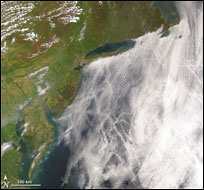
Journalists, bloggers and communicators of all kinds often find themselves in a contentious debate over the truth behind global warming. The reasons that “skepticism” or “contrarianism” and the like persist in public discourse are numerous, and there is a great deal of research literature on this question.
Although many facets of the science are evolving, and the precise relationship between individual weather events and climatic shifts is still being studied, the scientific community has come to the overwhelming consensus that human-induced climate change has been taking place. Institutions such as NOAA and the United Nation’s IPCC have long established this. Still, new papers and research perspectives occasionally emerge to challenge various facets of the trend. New narratives, such as that suggesting that there is a global warming “slowdown,” also periodically seem to challenge the science.
So how strong is the actual consensus? That issue often matters when contrary points of view are raised, and the voices of skeptics are invoked. How can a media member avoid the perils of “false balance”?
The following are three papers that analyze precisely scientists’ agreement on climate change; they may be useful citations in any article or debate:
______
“Quantifying the Consensus on Anthropogenic Global Warming in the Scientific Literature”
Cook, John; Nuccitelli, Dana; Green, Sarah A.; Richardson, Mark; Winkler, Barbel; Painting, Rob; Way, Robert; Jacobs, Peter; Skuce, Andrew. Environmental Research Letters, January 2013. doi:10.1088/1748-9326/8/2/024024.
Abstract: “We analyze the evolution of the scientific consensus on anthropogenic global warming (AGW) in the peer-reviewed scientific literature, examining 11,944 climate abstracts from 1991-2011 matching the topics ‘global climate change’ or ‘global warming’. We find that 66.4% of abstracts expressed no position on AGW, 32.6% endorsed AGW, 0.7% rejected AGW and 0.3% were uncertain about the cause of global warming. Among abstracts expressing a position on AGW, 97.1% endorsed the consensus position that humans are causing global warming. In a second phase of this study, we invited authors to rate their own papers. Compared to abstract ratings, a smaller percentage of self-rated papers expressed no position on AGW (35.5%). Among self-rated papers expressing a position on AGW, 97.2% endorsed the consensus. For both abstract ratings and authors’ self-ratings, the percentage of endorsements among papers expressing a position on AGW marginally increased over time. Our analysis indicates that the number of papers rejecting the consensus on AGW is a vanishingly small proportion of the published research.”
“The Structure of Scientific Opinion on Climate Change”
Farnsworth, Stephen J.; Lichter, S. Robert. International Journal of Public Opinion Research, October 2011. doi: 10.1093/ijpor/edr033.
Findings: Of the 489 scientists surveyed, 97% agreed that global temperatures have risen over the past century. Moreover, 84% agreed that “human-induced greenhouse warming” is now occurring.” Only 5% disagreed with the idea that human activity is a significant cause of global warming. “There was greater debate over the likelihood of substantial warming in the near future, with 56% seeing at least a 50-50 chance that temperatures will rise” 2 degrees Celsius over the next 50 to 100 years. “When [survey participants were] asked to rate the effects on a ten-point scale from trivial (1) to catastrophic (10), the mean response was 6.6, with 41% seeing great danger (ratings of 8-10), 44% moderate danger (4-7), and 13% little danger.”
“Expert Credibility in Climate Change”
Anderegg, William R.L.; Schneider, Stephen H., et al. Proceedings of the National Academy of Sciences, April 2010, Vol. 107, No. 27, 12107-12109. doi: 10.1073/pnas.1003187107.
Findings: About 97% of the group with the most expertise — the 908 climate scientists with 20 or more papers published — are convinced by the evidence of human-induced climate change. Those who are unconvinced by the evidence make up “only 2% of the top 50 climate researchers as ranked by expertise (number of climate publications), 3% of researchers of the top 100, and 2.5% of the top 200.” Researchers with fewer than 20 climate publications comprise 80% the group that is unconvinced, as opposed to less than 10% of the group that is convinced by the evidence: “This indicates that the bulk of [unconvinced] researchers on the most prominent multi-signatory statements about climate change have not published extensively in the peer-reviewed climate literature.”
Tags: climate politics, global warming, greenhouse gases, research roundup
